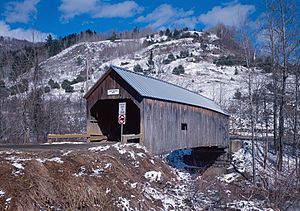Flint Covered Bridge facts for kids
Quick facts for kids Flint Covered Bridge |
|
|---|---|
 |
|
| Carries | Automobiles |
| Locale | Tunbridge |
|
Flint Covered Bridge
|
|
| Location | Tunbridge, Vermont |
| Area | 1 acre (0.40 ha) |
| Built | 1845 |
| Architectural style | Queenpost truss |
| NRHP reference No. | 74000239 |
| Added to NRHP | September 10, 1974 |
| Characteristics | |
| Design | Queenpost Truss Bridge |
| Material | Wood |
| History | |
| Construction end | 1845 |
The Flint Covered Bridge is a really old and special covered bridge in northern Tunbridge, Vermont. It carries Bicknell Hill Road over the First Branch White River. This bridge was built way back in 1845, making it the oldest of five 19th-century covered bridges in Tunbridge. This area has one of the largest collections of covered bridges in all of Vermont! Because it's so important, it was added to the National Register of Historic Places on September 10, 1974.
What Makes This Bridge Special?
The Flint Covered Bridge is located in the very northern part of Tunbridge. It's just south of the town of Chelsea, and you can find it carrying Bicknell Hill Road over the First Branch White River, near Vermont Route 110.
How It's Built
This bridge is a single-span Queenpost truss bridge. A "truss" is like a strong framework of triangles that helps the bridge hold up weight. It's about 87 feet (26.5 meters) long. The bridge sits on stone supports that have been covered with concrete to make them even stronger. It's 17.5 feet (5.3 meters) wide, but the part cars drive on is about 15 feet (4.6 meters) wide, which is enough for one lane of traffic.
To make the bridge even more sturdy, iron rods hang down from the diagonal parts of the truss. Also, strong wooden beams called "laminated stringers" were added underneath the deck. Steel cables criss-cross between the deck parts to help keep the bridge stable from side to side. The outside walls and the entrance areas are covered with vertical wooden boards. A gabled metal roof protects the bridge from the weather.
Its Long History
The Flint Covered Bridge was built in 1845, making it the oldest of Tunbridge's five covered bridges. It got a big update in 1969. During this renovation, its outside siding was replaced with new wood that looked just like the original.
Along with a bridge in Chelsea, the bridges in Tunbridge are all found along a 7-mile (11 km) stretch of the same river. This area has one of the highest numbers of historic covered bridges in Vermont. They are a cool reminder of how bridges were built a long time ago!



